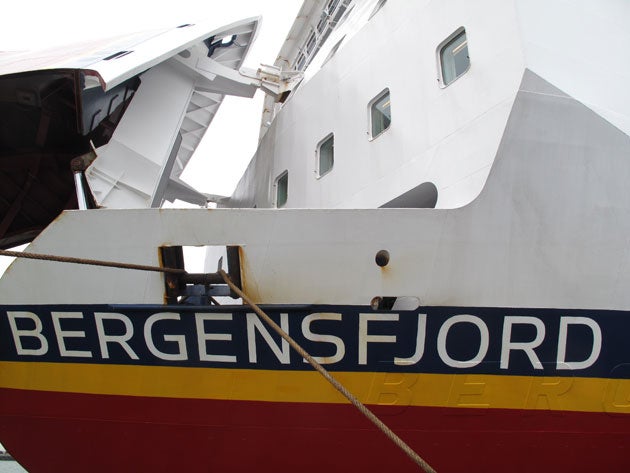Simon Calder: Why both sides profit from overbooking
The man who pays his way

Three virtues of 21st-century civilisation: education, sanitation and overbooking. You may have reservations about the last of these, but bear with me. The travel industry's custom of selling the same seat or bed more than once is not an example of unashamed greed. It represents a sound business practice that brings benefits to many, particularly those who have reservations.
Late on Wednesday evening I boarded the good ship Bergensfjord in the Norwegian port of Stavanger. For the past 18 years she has sailed to the Danish port of Hirtshals. This is her last summer on the run: she is due to be replaced next May by a superferry, offering many more than the 212 cabins aboard the present ship. Meanwhile, a congregation of scout troupes and business travellers, Scandinavian families and stag parties cram aboard. Not all of them are guaranteed a good night's sleep.
As the ship prepared to sail, the purser offered 3,000 Norwegian krone (£330) to any passenger prepared to relinquish their cabin. Based on previous experience, Fjordline had estimated that four bookings for cabins would be "no-shows". Therefore four extra parties of passengers were allowed to book than the number of cabins available. Had the company guessed right, it would have earned an extra £200 from each twice-sold cabin.
As it happened, on the eve of the Ascension Day holiday, everyone showed up. There were no confrontations, because the issue was handled by throwing money at it. Enough people were prepared to accept a cash sum way above what they had paid for their cabin for the problem to vanish as quickly as the Norwegian mainland behind a veil of North Sea murk.
Travel is not like other industries. The seats and beds that it produces are for rent, not for sale. Every night a room goes unoccupied, and every time a train, boat or plane departs with empty space, potential income has been lost forever.
Travel customers, too, are unusual: they may fail to take delivery of the transportation or accommodation they have booked. That is rarely forgetfulness. It happens either because there is no penalty for being a "no-show", for example on expensive airline tickets or pay-on-departure hotel rooms, or because the penalty is so heavy (often 100 per cent of the price paid) that there is no point in cancelling when your plans change.
Overbooking addresses these phenomena, and helps allocate scarce resources efficiently. An airline flying a 400-seat Jumbo jet from Heathrow to Australia on the last Saturday before Christmas can help to satisfy the heavy demand by selling 20 seats twice. If the airline's planners are right and 400 people show up, its bet will pay off to the tune of around £20,000. And the last 20 people to book, who were sold seats that were theoretically already filled, will get to travel on the flight they wanted.
Should the prediction go awry, the bidding begins. The airline needs to raise its compensation offer to the point at which enough passengers will postpone their trips to accommodate the "oversell". The only time overbooking becomes a problem is when companies are insufficiently generous. The standard offer from Virgin Atlantic, I understand, is a return ticket to anywhere the airline flies – except Sydney.
Experiencing a rude awakening in Norway
Stavanger, where I spent the first half of the week, is a friendly, hospitable port. At this time of year a prime destination for cruise ships. The harbour is big and deep enough to accommodate two gargantuan cruise ships at once, whose passengers find themselves only a few steps away from the clapboard buildings that line the quayside and clamber prettily across the city. But those of a sensitive nature should look away from some of the shopfronts in Stavanger's profane precinct.
Most hairdressers, as you know, rely on dismal puns to promote their business. Stavanger has one, called "Hair and There". But around the corner is the upstairs salon apparently aimed at customers unhappy with their locks: it is called "Cut The Crap".
Almost opposite stands a boutique that appears to be thriving despite its name. This Norwegian designer store invites customers to demonstrate to the world "I'm wearing S*** clothes".
Should you feel that the best souvenir of Stavanger would be a tattoo, then hurry along to the parlour just up the hill; get there too late, and the sign outside instructs you to "F*** off, we're closed".
Join our commenting forum
Join thought-provoking conversations, follow other Independent readers and see their replies
Comments
Bookmark popover
Removed from bookmarks